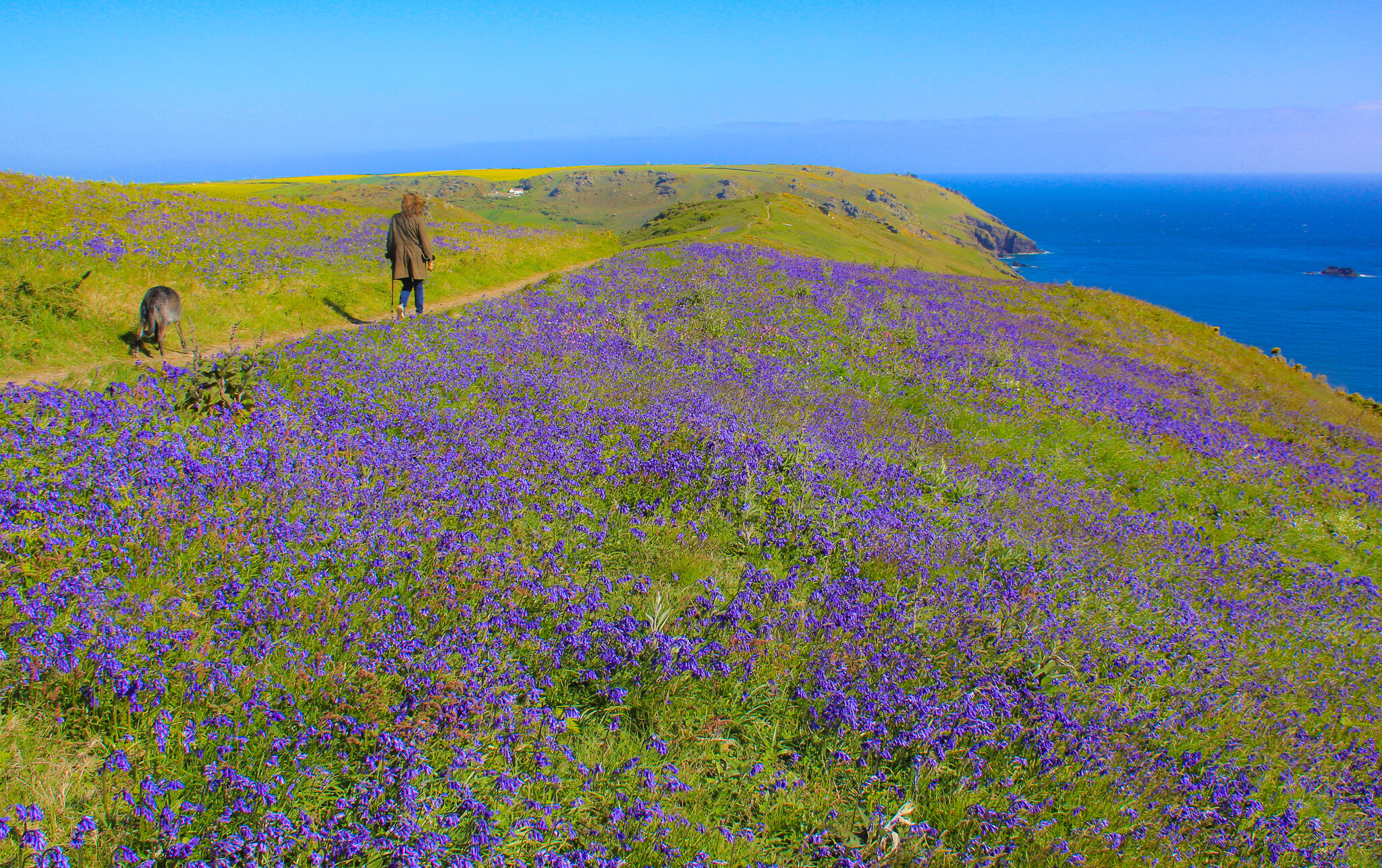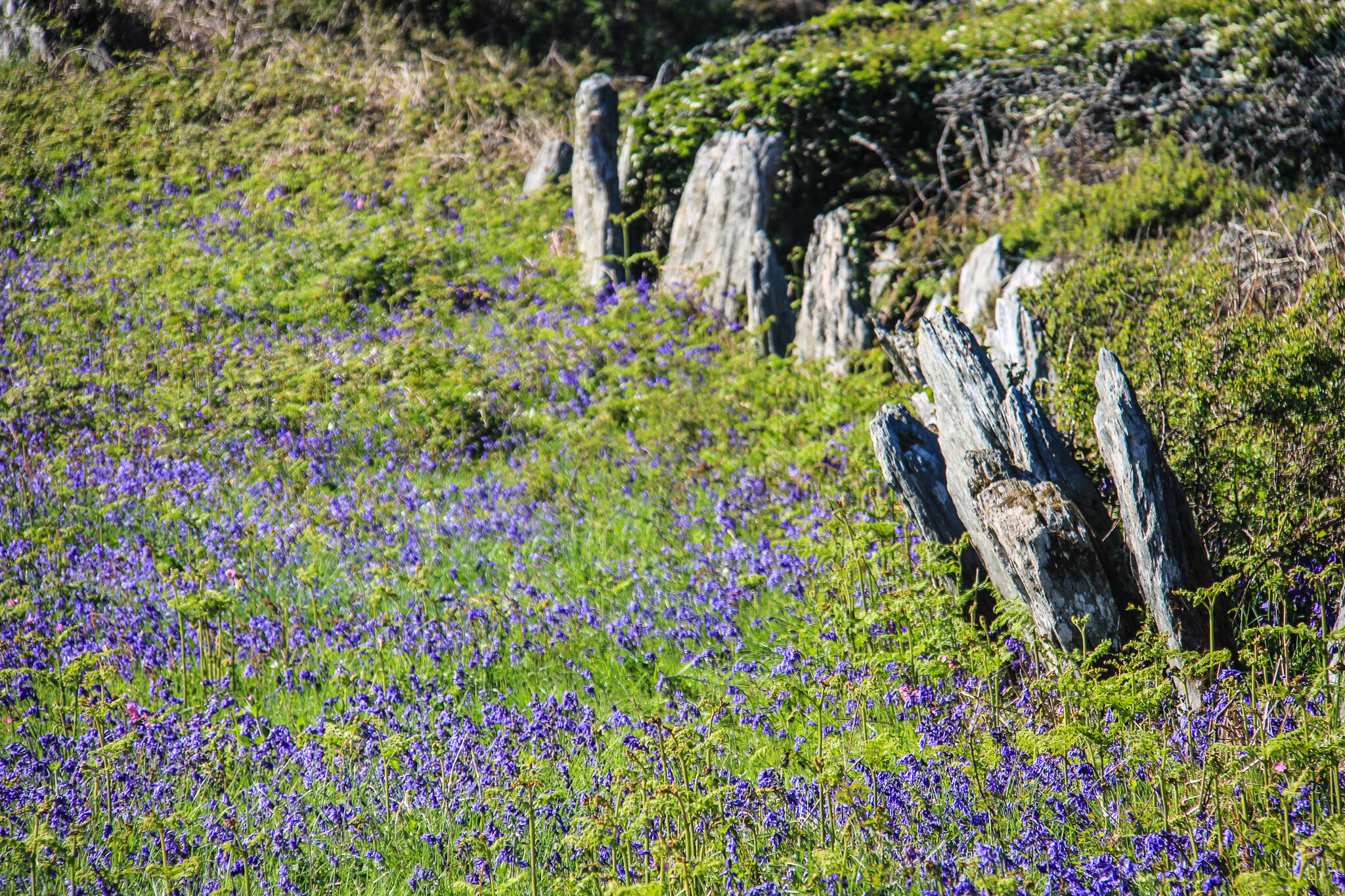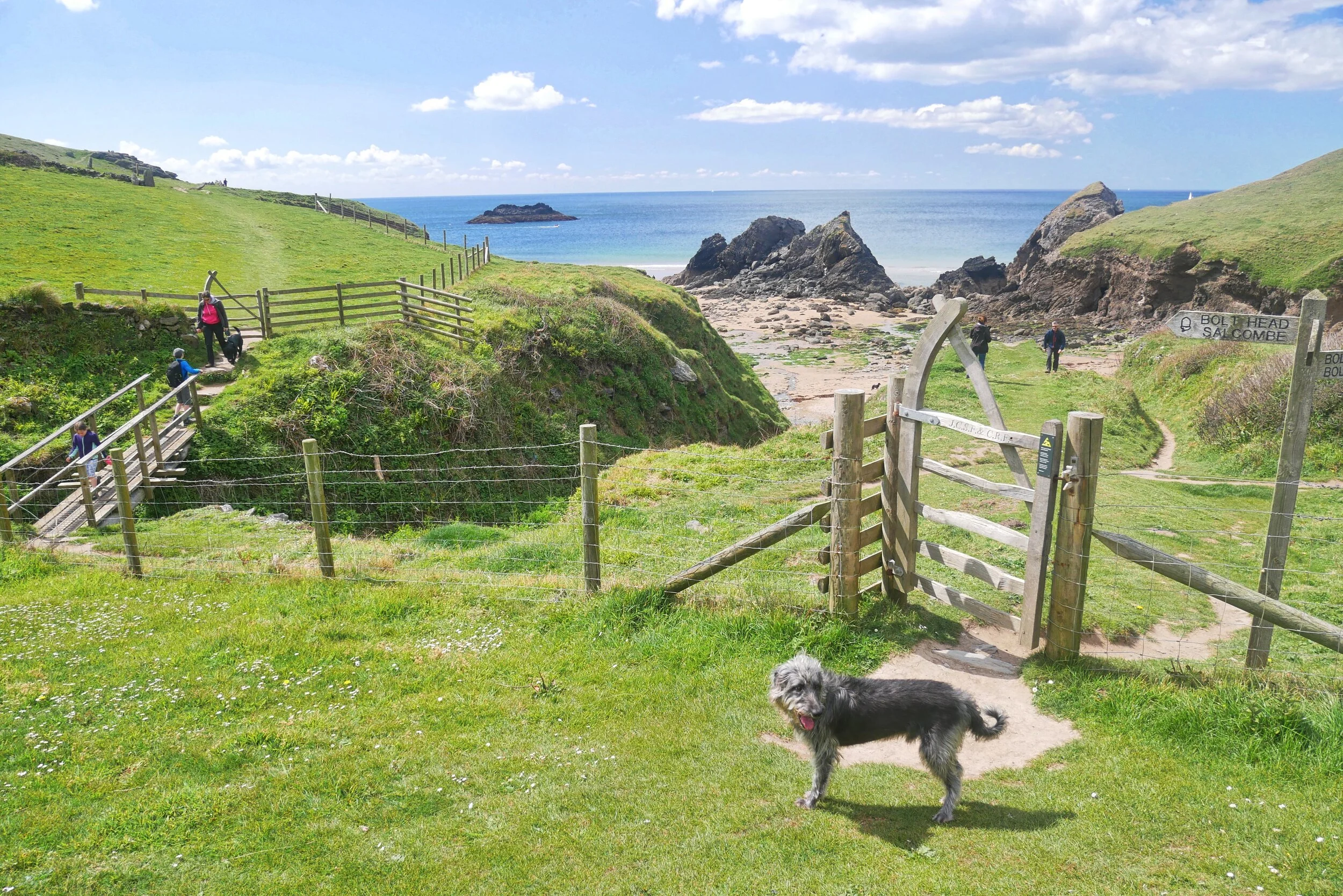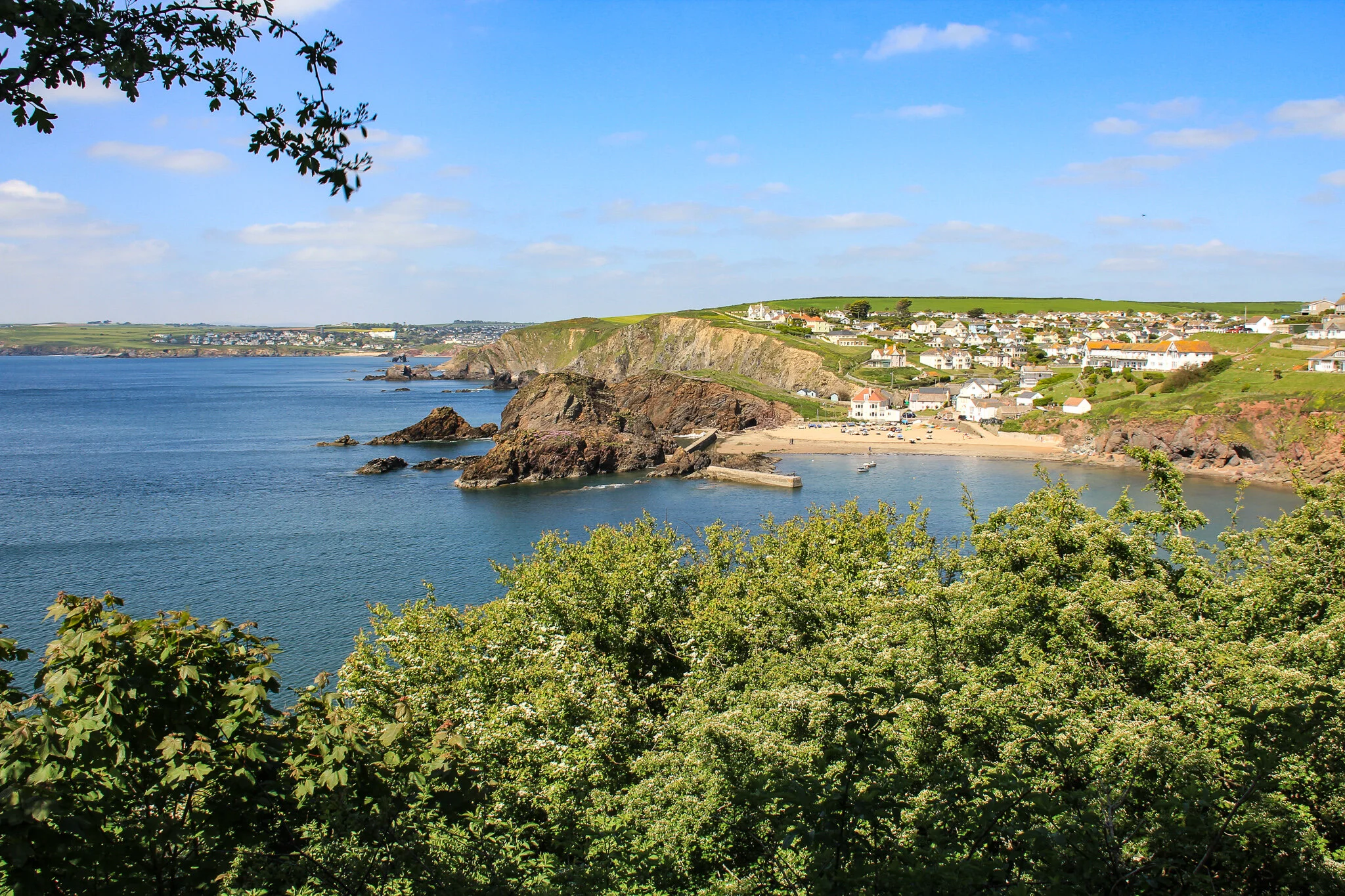Devon Walks - Hope Cove-Bolberry Down
Every now and again we all need some kind of consolation prize. Such were my thoughts one day a few years ago when I flew out to the Scillies to cover the Royal visit for my newspaper – it was a truly excellent day out, but the need for a consolation prize came in the eye-watering form of the archipelago’s great, sunlit, beauty.
Hope Cove shelters in its bay
Never have I seen the islands look quite so alluring. As I said in my newspaper report on the visit, they were doing a very good job of looking like some billionaire’s retreat in the Caribbean. I, alas, was in and out of the archipelago in three short hours – much of which was spent in a darkened pub writing copy.
So what I needed back on the mainland was a consolation prize – a lovely sunlit seaside zone in which to wander… And none could be more fit for purpose that the magical area around Soar Mill Cove right down there in Devon’s most southerly sunshine zone.
At Hope Cove you have Outer Hope and Inner Hope – at the latter there are a number of ancient cottages looking suitably quaint and fisher-folkish, which isn’t surprising as the place was once famed for its crabs.
The one confusing thing about the two neighbouring communities is their seemingly misplaced names. To me Outer Hope should be Inner Hope, and vice-versa – Outer actually being more Inner in the greater scheme of things if you look at a map.
Anyway, we parked at Outer Hope and walked out - away from inland Devon - towards the sea at Inner Hope, which is where the coast path climbs away from the buildings to pass through a small stand of trees on its way out to Bolt Tail.
This is a very special bit of littoral walking simply because you do not often get such sweeping westerly views along the south coast. Bolt Tail stands proud like a giant tooth nailed onto the eastern extremity of Bigbury Bay – and as such affords as good a panorama as any cape I know.
The path at Bolt Tail
The whole of Bigbury Bay lies before you - but you can see far, far beyond Burgh Island, past the Great Mew Stone, west again beyond the Plymouth ferries to-ing and fro-ing from France and Spain - and on again until that other great headland, The Dodman, seals the horizon with its barren flanks.
Bigbury and Burgh Island to the left
It’s along the next section of coast path heading east that you can peer down the increasingly tall cliffs to spy the Ramillies – which is a rock named after a doomed ship.
The writer SH Burton, in his book South Devon Coast, explains that a boat of that name was wrecked here in the hurricane of February 15th, 1790. “Her captain mistook Bolt Tail for Rame Head and thought he was being driven into the Sound. When the mistake was realised they let go their anchor and, by cutting away all the masts, managed to ride safely until evening. Then the violence of the wind increased and the cable parted. A midshipman and 25 of the crew made a perilous leap from the stern to the rocks that fringe Ramillies Hole, a narrow cleft. They were saved, but the rest, 708 in all, perished.”
Heading south east the path climbs until it reaches some 400 feet above the waves, then forgets to do its usual trick of emulating a roller coaster and adheres, instead, to the level confines of the high downs.
The National Trust has celebrated this unusually flat bit by installing a wheelchair-friendly path so that the less-abled can enjoy the stunning sea views.
Eventually, though, the path is hurled into the abyss. The abyss in question being the valley behind Soar Mill Cove, guarded by the craggy reaches of Cathole Point. It is all very wild and untamed, and picturesque and the cove itself is an absolute jewel.
Down into this wondrous coastal cleft we went to enjoy half an hour on the fine sands of the cove - then it was time to start out on the return leg of the walk. We went inland this time, up the valley under Hazel Tor to zig-and-zag our way up to Southdown Farm.
Here there’s a junction of footpaths and we took the left hand one that heads north-west across a field until it reaches a wide track. Turning left again we wandered a quarter of a mile along to the Bolberry lane where we turned right. At the bottom of the hill it was a quick left and then right turn into a lane which took us further down into the valley, past a farm and some cottages, before climbing towards North Bolberry and Higher Barton.
It’s the latter that we’re heading for, and we reach it by ducking down the narrow track called Sweetheart’s Path which you will see on the left-hand apex of a sharp corner. The romantic path crosses a shoulder of land and introduces us to the drive that links North Bolberry to Higher Barton – we turn left and head for the latter, but just before we enter its garden find the public footpath that climbs to our right and takes us up to the very top of the ridge.
Now it’s simply a matter of turning left on the ridge path that leads almost straight down the gently descending hill which eventually terminates where Inner and Outer Hope meet.
Cottages in Inner Hope
A perfect and easy walk in perfect walking country – and one which afforded perfect consolation prize for someone snatched away from the Fortunate Isles without enjoying hardly a sniff of just how fortunate they are.
Fact File
Basic walk: From Outer Hope out to Bolt Tail then east along coast path over Bolberry Down to Soar Mill Cove returning inland via Southdown Farm, through hamlet of Bolberry and along descending seaward ridge.
Recommended map: Ordnance Survey Explorer OL20 South Devon.
Distance and going: just over four miles, fairly gentle climbs, easy going.
LOCAL KNOWLEDGE
Hope Cove House
I’ve stayed at this excellent establishment tucked away just above the beach at Inner Cove - a wonderful place tin which to base a South Devon walking holiday.
It is well known that we are a nation of potato-lovers, but now a company called Devon Cove Produce has come up with a product that allows to consumers to enjoy their spuds in a whole different way.
Hope Cove House
Cove Vodka
Not many walks have their own vodka, but this one does. After a year of research, planning and testing, the company has launched the county’s first potato vodka.
The new, luxuriously smooth Cove Vodka is produced using local South Hams King Edward potatoes as the base ingredient. The potatoes are grown in rich soils on south-facing slopes just above the sea at the well-known beauty-spot of Hope Cove.
The Lidstone family have been growing potatoes in the area for more 50 years, but it was daughter Leanne Carr - founder of Devon Cove Produce - who came up with the idea of turning the crop into something with just a little more kick than a chip.
She told me: “After many discussions around the dinner table about the different ways you can cook and enjoy potatoes, we decided to take things a step further and use the crop to make vodka.
“Using the finest Devon potatoes and local spring water - combined with small batch traditional copper pot distillation - we have created a distinctly smooth and delicious vodka which we believe captures the essence of Devon.”
So smooth and clean is the resultant vodka, that it can be enjoyed straight on its own - but many will prefer it with a mixer or as the base spirit in a cocktail.
Leanne recommends Cove Vodka poured over ice, with chilled soda water and a squeeze of fresh lime.
“As the carbohydrates in the potatoes do not translate into the vodka, and no sugar is added, it is about as low in calories as an alcoholic drink can be,” she explained.
In addition, Devon Cove Produce has launched Cove Damson Liqueur, a smooth and fruity creation made with ripe West Country damsons infused with Cove Vodka.
Cove Vodka is available in three sizes: 5cl at £5.95, 20cl at £18 and 70cl at £39.50. Cove Damson is available in two sizes: 20cl at £18 and 50cl at £33. Both can be purchased online at www.devoncove.co.uk or through a list of stockists featured on the website.
Keep up-to-date on Cove Vodka’s progress on Instagram @devoncovevodka #covevodka and on Facebook by following Devon Cove Vodka.























